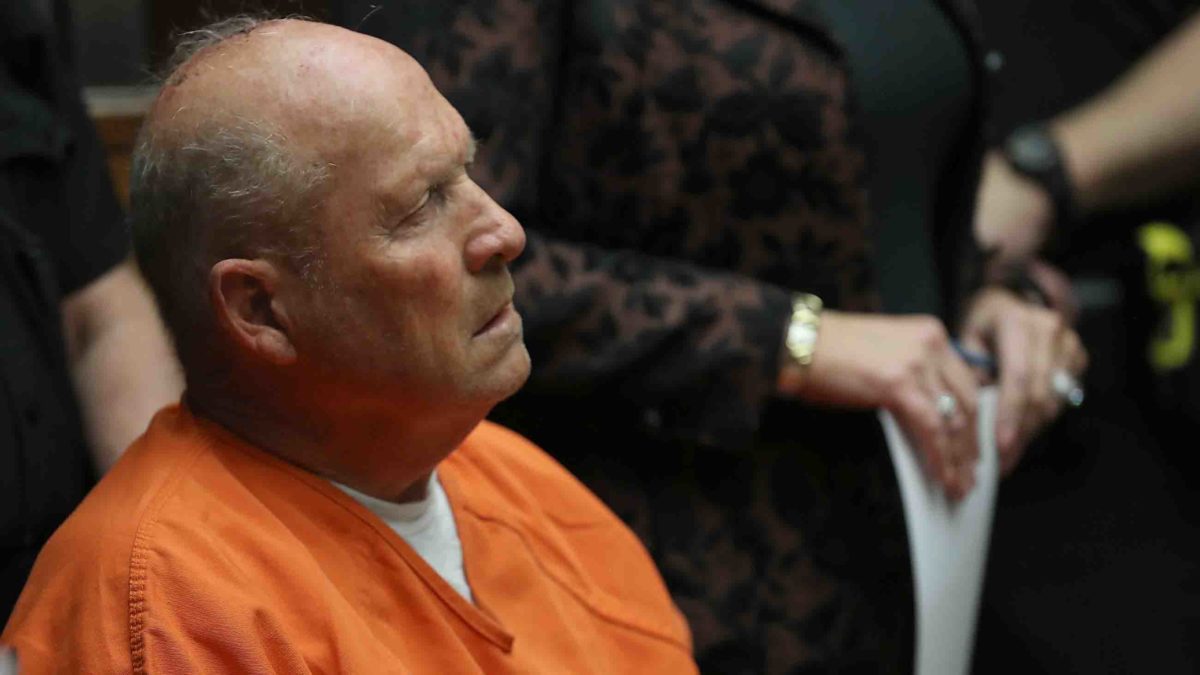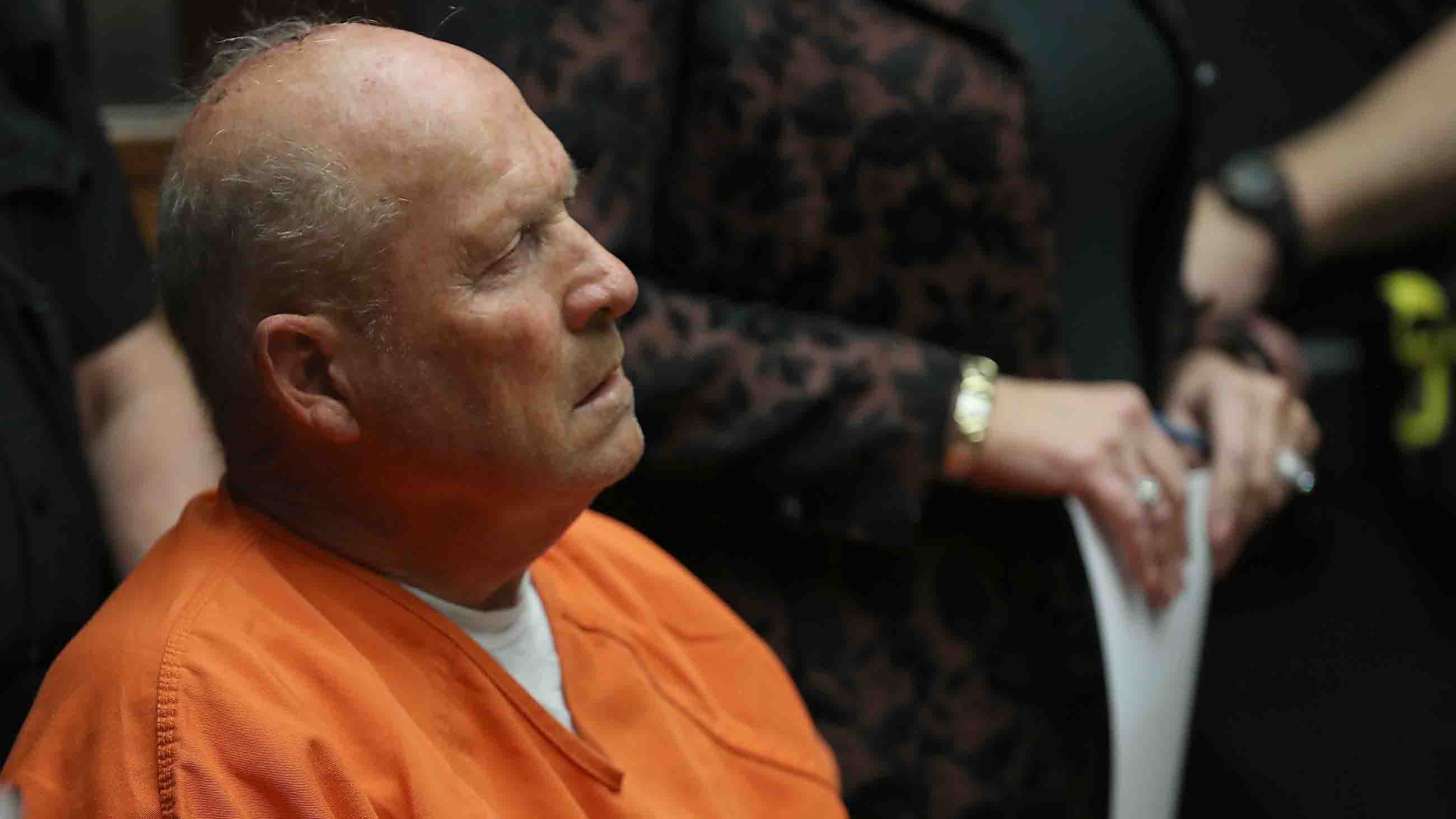After police announced earlier this year that they had tracked down the suspected Golden State Killer – wanted for committing dozens of rapes and at least 12 murders across California during the 1970s and 80s — it was revealed that they had used information from a public DNA database to figure out his identity.

Joseph James DeAngelo, the suspected “Golden State Killer,” appears in court for his arraignment on April 27, 2018 in Sacramento, California.
Visual: Justin Sullivan/Getty Images
While such repositories have long been searched by genealogists to help adoptees track down their birth parents, their use in the discovery and arrest of Joseph James DeAngelo in April marked new territory for many in the criminal justice system. Since then, police have used similar methods to make arrests or generate new leads in nearly half a dozen other cold cases, raising concerns among the public regarding genetic privacy.
In five of the cases, including DeAngelo’s, police uploaded DNA sequences obtained from old crime scenes to GEDmatch, which contains some million genetic profiles. From there, they were able to search for families that the perpetrators might belong to, then cross-reference members of those families with the demographics of their suspects.
Although this isn’t the first time ancestry sites or genetic testing companies have been contacted by law enforcement with requests for user data, GEDmatch differs in that it’s open-source, giving anyone who logs in the ability to search for comparisons among the site’s million genetic profiles, unless they have been designated private.
While GEDmatch said after DeAngelo’s arrest that they were not contacted by police, their privacy policy does make clear that DNA uploaded may be used by law enforcement to “identify a perpetrator of a violent crime against another individual” — crimes which it defines as murder or sexual assault.
Still, as consumers face the potential for police to access their data, genetic privacy experts say that making sure the risks are clear and transparent will become increasingly important.
Also in the news:
• Atul Gawande, the Harvard-based surgeon and author of best-selling books on the failings of America’s health system, was given still another high-powered title last week — as CEO of a joint venture that will manage health care for three of the nation’s most prominent companies: Amazon, Berkshire Hathaway, and JPMorgan Chase. The appointment raised eyebrows: Gawande has no experience running a business, other than Ariadne Labs, the Boston-based center he founded to study innovation in health systems. So this past week, at the Aspen Ideas Festival, he elaborated on his plans for the new venture. He noted that like society as a whole, the three companies and their employees devote about 18 percent of their spending to health care, but because of inefficiencies and misdirected resources, about a third of that “is to no benefit of the patient, and often to the harm.” He said his job would be “to figure out ways that we are going to drive better outcomes, better satisfaction with care, and better cost efficiency with new models that can be incubated for all.” And that, he added with a chuckle, “is a tall frickin’ order.” (NPR)
• Hundreds of forest experts and policymakers that met this week at the Oslo Tropical Forest Forum were delivered some unwelcome news: According to data collected by the monitoring group Global Forest Watch, 2017 marked the second-worst year on record for tropical forests. In Brazil, man-made fires destroyed more than 3 million acres of trees, while in the Democratic Republic of Congo, forest loss driven by new industrial logging operations climbed 6 percent from 2016. In other regions, like the islands of Dominica and Puerto Rico, an extreme hurricane season is to blame. In all, 39 million acres of tree cover — an area roughly the size of Bangladesh — was lost worldwide. (New York Times)
• Justice Anthony Kennedy announced his retirement from the U.S. Supreme Court on Wednesday, a move that has generated mixed reactions along party lines. With Kennedy’s leaving at the end of next month, President Trump will have the opportunity to choose a replacement to sway the court in an assuredly more conservative direction. Kennedy has served as the swing vote in a number of pivotal cases, including those centered on abortion rights and same-sex marriage. Without him, pro-choice advocates fear that Roe v. Wade, the 1973 decision that upheld a woman’s right to obtain a legal abortion, could face a serious challenge. Still, overturning the decision could take years. According to Vox, “a state would need to pass a law clearly incompatible with the Court’s existing approach to abortion rights and wait for the challenge to reach the Supreme Court before the new justice would have a chance to join a ruling.” (The Washington Post)
• An experimental treatment that used genetically-modified poliovirus to fight a deadly form of brain cancer showed mixed but promising results, researchers reported this week. In a small study involving 61 patients with glioblastoma, the most common and aggressive type of brain cancer, researchers at Duke University introduced the virus — which was altered to prevent it from causing polio — directly into tumors in the brains of patients. Retaining the ability to infect and kill the tumor cells, the researchers said the virus also appeared to trigger an immune system response in patients. After three years, 21 percent of the participants that received the treatment survived, compared to 4 percent of the historical comparison group that had not. The treatment can carry substantial risks, including brain swelling and seizures, but cancer specialists praised the results as encouraging. Along with follow-up testing using a combination of therapies, including chemotherapy and immunotherapy, to improve patient outcomes, the researchers also plan to try the treatment on other cancers, and pediatric patients, in the future. (NPR)
• The U.S. Department of Justice on Thursday announced charges against more than 600 people in what it said amounts to the largest takedown of health care fraud in the country’s history. Those charged include dozens of doctors, pharmacists, and nurses, who are said to have contributed to more than $2 billion in losses due to medical fraud. Much of this fraud, according to Attorney General Jeff Sessions, relates to the U.S. opioid epidemic — which caused more than 40,000 deaths in 2016. More than 160 people were charged with illegally distributing prescription painkillers. Among them are a pharmacy chain owner and two others in Texas who are accused of using fake prescriptions to fill orders for more than 1 million hydrocodone and oxycodone pills, which they then sold for distribution. (Reuters)
• And finally: A series of new studies suggest that male academics are far more likely to be referred to by their last names alone (think Einstein, Darwin, etc.), than their female counterparts. The researchers, who published their work this week in the Proceedings of the National Academy of Sciences, looked at nearly 4,500 reviews by students taking a variety of physical and social science courses at 14 American Universities, finding that male professors were 56 percent more likely to be referred to by their last names alone than female professors. (Related studies by the same research team found that the disparity extends beyond academia, from politics to sports.) So what? Additional surveys suggested that we tend to more frequently associate status and power with people referred to by their last names alone. And such findings, the researchers concluded, “may partially explain the persistent state of women’s underrepresentation in high-status fields — including science, technology, engineering, and math.” (Science)











Comments are automatically closed one year after article publication. Archived comments are below.
I am dismayed that your report on CO2 extraction did no mention what is drastically wrong wth the press coverage. To turn the recovered CO2 into fuel would of necessity requre at least as much, and probably far more, energy input than could ever be obtained from the fuel produced.